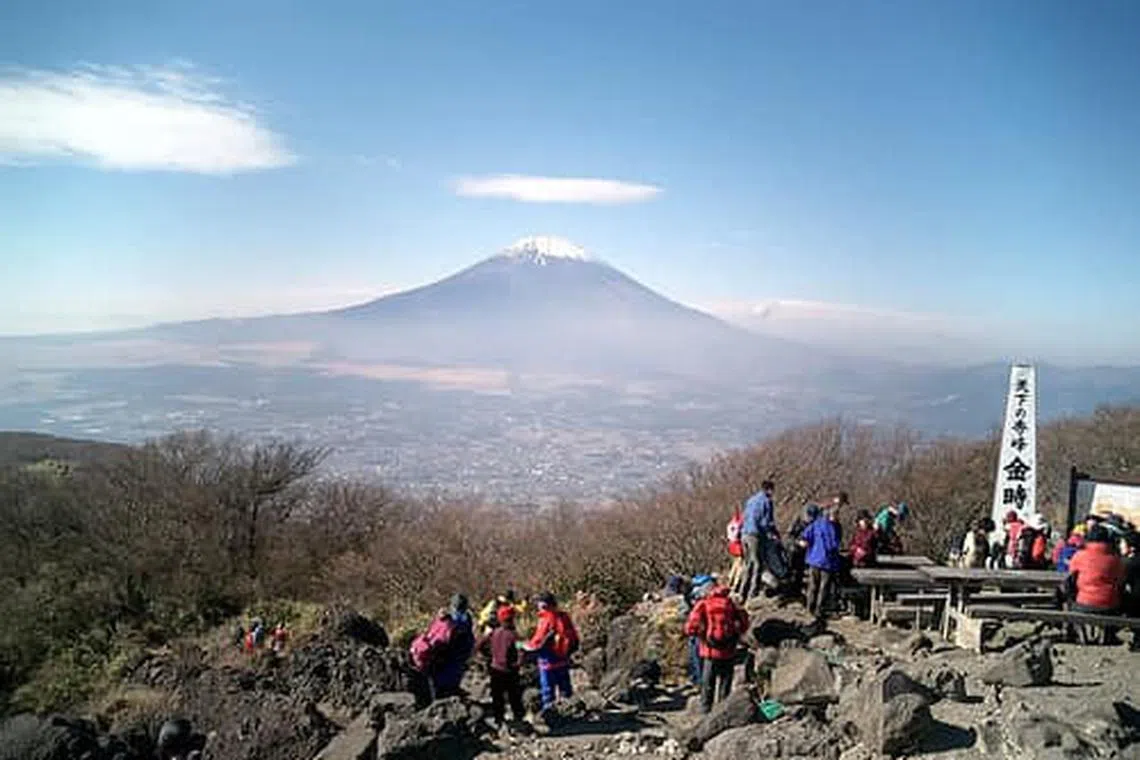Mounting tourism costs prompt Japan hot spring town Hakone to consider lodging tax
Sign up now: Get insights on Asia's fast-moving developments

The view of Mount Fuji from Mount Kintoki in the Fuji-Hakone-Izu National Park in Japan.
PHOTO: HAKONE JAPAN/FACEBOOK
Follow topic:
Visitors to Japan’s hot spring town Hakone could need to pay more for accommodation in the coming years, as its authorities are considering taxing lodging to cope with rising tourism-linked costs.
The mountainous resort area is famed for its tranquil hot springs, traditional inns and vistas of Japan’s tallest peak, Mount Fuji.
Located just a 1½-hour train ride away from capital Tokyo, Hakone draws roughly 20 million visitors annually.
But this popularity has taken a toll on the town’s authorities, reported national daily The Mainichi.
The costs of maintaining and operating tourist facilities as well as providing services that involve tourists such as rubbish and sewage disposal have exceeded the scale for the small town of about 10,000.
This comes as municipal tax revenues have declined since a peak of 7.84 billion yen (S$67.7 million) in fiscal year 1996 due to a prolonged economic slump.
While the town raised property tax on owners of land and houses in 2016, the shortage of financial resources is set to worsen due to many factors, including a declining population that is plaguing Japan.
The idea to tax tourists was mooted nearly six years ago as the lack of financial resources loomed, reported local news outlet Kanagawa Shimbun at the time.
The Mainichi reported that even with revenue from tax that visitors pay to use hot springs, also known as bathing tax, the town still needed 2.36 million yen in the fiscal year of 2019.
That year, the town convened a nine-member panel of experts to study new sources of tourism revenue. Discussions that were suspended during the Covid-19 pandemic restarted in October 2023.
One idea being mooted is to raise the town’s bathing tax, which is currently priced at 150 yen for an overnight stay and 50 yen for visitors who take a day trip.
Hakone has held pole position in Japan in terms of both bathing tax revenue and the number of people dipping into hot springs for nearly 40 years, according to The Mainichi.
However, revenue earned from hiking bathing tax is restricted under Japan’s laws to purposes such as tourism promotion and the maintenance of firefighting facilities.
Another idea being discussed is the introduction of an accommodation fee – a tax that has already been introduced in Tokyo, Osaka and Kyoto.
Such fees are slated to be implemented at other popular tourist destinations such as Hokkaido’s Niseko mountain resort, which is set to tax 2,000 yen per night on hotel stays from November 2024.
The hot spring towns of Shizuoka and Atami, which are also popular with tourists looking for a glimpse of Mount Fuji, will also introduce an accommodation tax of 200 yen per person per night from April 2025.
However, the tax’s effectiveness in boosting Hakone’s coffers is likely to be limited, as 70 per cent of the town’s visitors do not stay overnight.
Another solution being studied by the panel is a voluntary conservation fee of 1,000 yen that the Yamanashi and Shizuoka prefectures have implemented to protect Mount Fuji, Japan’s most popular tourist attraction.
A report on the panel’s findings is expected to be ready by September 2026.


